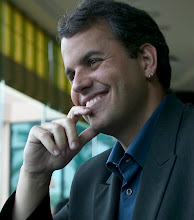Yesterday, Jon Taplin asked me to give my future of virtual worlds talk to his COMM 306 class, "The Communications Revolution, Entertainment and Art." His class was initially slow to ask questions, but once they got rolling it was great fun. Especially in an extended Q&A after class, they had very good queries about the impact of technology on privacy and culture.
They were quick to work through the implications of always on, mobile devices. Jon asked them whether they would consider life logging, or streaming the world around them to their friends. Initially it was the usual "hell no" but as they built on each others answers and started thinking through the implications, it didn't take long to get to "it's a natural extension of blogging", "I'd share it with my friends", "I'm bad at remembering names", and "I do it with Flickr already."
It was also a chance to sample a group of college juniors about technology. (It's a fairly large class, although predominantly communication and comm management undergrads, so obviously there are biases.)
Approximate percentages who had heard of or used the following (as measured by the incredibly scientific method of asking the audience questions and counting hands):
- Cell phone: 100%
- SMS: 100%
- Digital music/media: 100%
- Facebook: 95% (ie, almost everyone)
- Instant Messaging: 95%
- MySpace: 80%
- Regularly update something online: 75%
- LinkedIn: 40%
- Second Life: 25%
- Blog: 20% (lots of people who updated their MySpace page did not consider it blogging, hence the something stat, above)
- Online games: 10%
- World of Warcraft: 10% (and great reluctance to admit it)
- Twitter: 1 person (!)
- Knew about RSS or used it: 0%
- Had heard of Spore: 0% (!)
- Had heard of Sony Home: 0% (not as surprising as Spore, but still...)
To first order, everyone has a cell phone, listens to music, wants to be connected to their friends, and uses the web.
Good lessons as we think about the future.

